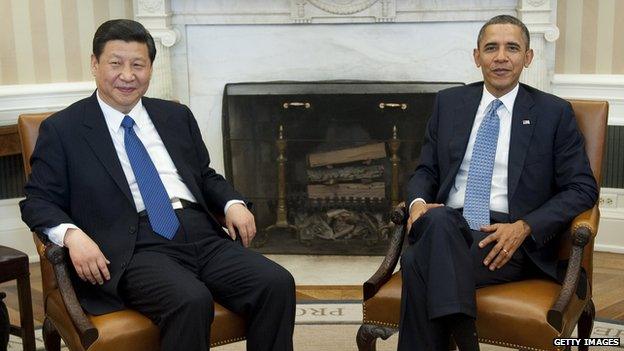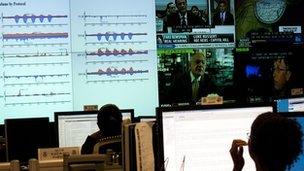Viewpoints: US-China summit
- Published

In 2012, when Xi Jinping was China's Vice-President, Obama received him at the White House
Barack Obama and Xi Jinping will spend two days together in California. Experts look at the prospects for change in the relationship between the two countries.
This week, US President Barack Obama and Chinese President Xi Jinping will meet at the Sunnylands estate in Rancho Mirage, California, for a two-day summit.
In advance of the meeting, four experts share their take on what to hope for during these talks - and what to realistically expect.
A 'screen saver' summit
Cybersecurity's rise to prominence now includes a starring role in a summit of the world's leading powers.
The main US objective is to start dialogue on curbing Chinese economic cyber espionage against American commercial interests through American norms of responsible behaviour, external in cyberspace.
China accepts neither the factual basis nor the normative endpoint of this dialogue, hence the expectation management the Obama administration has conducted on this issue.
But in this potentially century-long geopolitical competition, economic cyber espionage is yesterday's cybersecurity problem.
In the long run, China knows it cannot rely on this practice. It promises diminishing returns as US defences improve, as well as increasing reputation costs for China in the face of their implausible denials.
American power does not depend on stealing trade secrets from start-ups in Shanghai, underscoring economic espionage as a strategy for the weak.
The summit will not touch areas of long-term strategic competition concerning cyber power and ideas, especially expanding military cyber capabilities in both countries and increasing US-China clashes over internet governance.
Whatever the summit produces will be a screen-saver for cybersecurity - a snapshot of an exciting moment in the Golden State that reminds you how much hard work still awaits.
David Fidler is the James Louis Calamaras Professor of Law at Indiana University and a fellow at the IU Center for Applied Cybersecurity Research and the Asia and the Pacific Policy Society.
Confidence-building conference
Although Mr Obama and Mr Xi will want to discuss some critical specific issues - among them cybersecurity, economic and trade relations, North Korea and their respective military policies - this summit is clearly aimed at creating a productive working relationship for the long term.
Mutual strategic suspicion between the US and China is significant and desperately needs to be addressed.
Still, rather than seeking to build trust - a worthy but difficult and, at best, long-term goal - a more realistic objective would be to enhance the level of mutual confidence, predictability and transparency.
If successfully achieved, this will help both leaders to interpret future developments more accurately, minimising the risks of misunderstanding and facilitating their ability to communicate effectively.
Overcoming deeply ingrained suspicion will not be easy.

Threats to cybersecurity will be a topic of discussion
But if policy deliberations at the top are characterised by greater mutual confidence, this can help inform more objective mutual perceptions throughout each system. This would significantly enhance both sides' ability to handle key problems, not only avoiding and managing crises but creating positive outcomes across a broad spectrum of issues.
Neither party questions the importance of Sino-American relations for their own economic, political and security interests as well as for East Asia and the world. What is still in question, however, is whether the "new type of major power relationships, external" to which both leaders are nominally committed can be infused with meaningful substance.
No single meeting can transform relations. But the Sunnylands summit can go a long way toward answering that question.
Alan Romberg is Director of the East Asia Program at the Stimson Center, a non-profit and nonpartisan think tank that studies peace and security challenges around the world.
'Unprecedented' opportunity
The two-day set of meetings between Mr Obama and Mr Xi this weekend in Southern California is unprecedented.
First, it's unprecedented that a newly minted Chinese leader would head to the US this quickly. Second, the meeting will avoid the usual pomp and ceremony of a state visit, as well as the short, highly scripted exchanges that have marked previous meetings.
This is all to the good, given the long list of issues the two presidents need to discuss. Indeed, two days is just sufficient to talk about them, not resolve them.
Not surprisingly then, on background, both the Chinese and American side have emphasised that the meeting's real goal is to start building a personal relationship between the two leaders in the hope that it will create momentum for addressing problems of US-China relations in the future.
But rarely does statecraft work this way, especially when the disputes between the two countries are not ones of misunderstanding but are, instead, rooted in fundamental differences in history, political systems, and the norms that should guide the international system.
The danger is not that, after two days, the two presidents will not get along personally. The real danger is that, in an effort to get along, they will be less than frank with each other about the actual sources of the problems in the relationship.
That's a recipe for greater, not lesser, problems down the road.
Gary Schmitt is director of the Marilyn Ware Center for Security Studies at the American Enterprise Institute.
Sunnyland's foggy outlook
Mr Obama and Mr Xi will meet at a secluded California resort at the very moment both leaders are far more deeply immersed in internal problems than foreign policy. So whatever "achievements" they announce likely will be more for show than action.
For sure, neither wants explosions in their direct relations while they tend mainly to the homefront.
Mr Xi is setting two major policies in motion within China that may fit together or fundamentally clash. One is to squeeze down hard on intellectuals and dissent.
Mr Xi and his Politburo feel criticism of Communist Party rule has gotten out of hand, and they fear the sparks. Also, they need quiet domestically while they take their nation through what may well be challenging economic reforms.
The idea here is to strengthen the "free" non-state controlled side of their economy. With all the party and government corruption, this will be very messy.
Mr Obama is practically under siege in Washington with "scandals" from Benghazi to the IRS to challenging freedom of the press. Plus he faces mounting pressure to take military action in Syria.
Neither leader goes to summit land with a strong internal hand at the moment. That will make it very difficult to reach genuine compromises on the issues that divide them - China's cyberhacking, discrimination against US trade, and territorial assertiveness, and the US pivot to Asia.
Yet, a summit failure for both wouldn't help either. So, on key conflicts, look for magical words to smother differences. And what better domicile for diplomatic camouflage than Rancho Mirage.
Leslie Gelb is the President Emeritus of the Council on Foreign Relations.